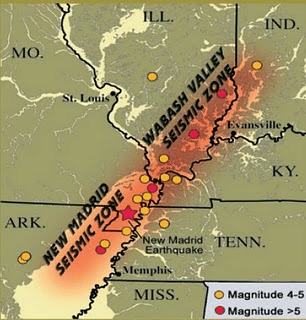The Arkansas Oil and Gas Commission has voted unanimously to ban disposal wells for unconventional gas drilling wastes in a region that has been inundated with earthquakes. The decision requires the immediate closure of one disposal well and prohibits the construction of new wells in a 1,150 square-mile radius. Operators have also closed an additional three disposal wells on their own initiative, the Associated Press reports.
Earthquakes have become unusually common in some areas of Arkansas where increased unconventional gas related drilling is taking place. Residents insist that there is a correlation between the quakes and the area’s wastewater disposal wells. After monitoring hundreds of earthquakes, the largest a magnitude-4.7 in February, investigators began confirming the connection.
The Oil and Gas Commission discovered that four disposal wells were situated on a fault line responsible for dozens of earthquakes this year alone. As reported by the Associated Press, “after two of the four stopped operating in March, there was a sharp decline in the number of earthquakes. In the 18 days before the shutdown, there were 85 quakes with a magnitude 2.5 or greater, but there were only 20 in the 18 days following the shutdown, according to the state Geological Survey.”
For Commission director Larry Bengal, the dramatic reduction in seismic events was enough evidence to justify the ban. “We have to side with that public safety concern and address that in a way that maybe science does not totally support,” he said.
In April, gas industry giant Chesapeake Energy spokesman said the company disagreed with the alleged relation. “We believe there is a lot of natural seismicity in this area and there’s a lot more sub-surface data, and science and facts that need to be brought to bear.”
However, when a scourge of more than 800 earthquakes occurred in Guy, Arkansas over a span of six months, Chesapeake and another operator, Clarita, temporarily suspended their use of injection wells.
The gas industry has widely advertised their use of underground disposal of fracking wastes with the hope that it will alleviate concerns of wastewater reentering the public water supply without adequate treatment.
Some fracking critics, like Dr. Theo Colborn of The Endocrine Disruption Exchange, suggest that wastewater injection in disposal wells reintroduces the risk to groundwater, “creating yet another source of extremely toxic chemical contamination.”
The risk in seismically sensitive areas like those in Arkansas are much higher, according to biochemist Dr. Ronald Bishop of State University of New York, Oneonta. Regions which are “seismically active or intensively fissured pose greater risks for contamination than regions which are geologically sensitive,” he told DeSmogBlog.
Arkansas’ increase in quakes shows the kind of geological sensitivity Dr. Bishop is concerned about. Yet, the Arkansas Oil and Gas Commission has not banned unconventional gas drilling in the area, only the use of disposal wells.
Earthquakes pose an enormous threat to the integrity of unconventional gas and disposal wells, potentially damaging cement casings, the sole barrier protecting underground aquifers from contamination.
Concerns about this issue have sparked several research projects. The Energy Institute at The University of Texas at Austin is initiating a comprehensive study of fracking technology, including its effects on seismic activity. The National Academies has also assigned a committee from the National Research Council to investigate the connection between injection technologies, like carbon capture and storage and fracking, and induced seismic activity.
But according to a geology professor at Marshall University, geologists have known for 50 years that underground fluid injection can cause quakes.
Another expert, Jack Century of J.R. Century Petroleum Consultants Ltd., says that high-pressure injection can have powerful effects underground. “When we start perturbing the system by changing fluid pressure, we have the potential for activating faults.” And “once local seismicity starts, it can’t be turned off.”
The decision by the Arkansas Oil and Gas Commission may have come too late. It remains to be seen whether the disposal well ban will lead to a reduction of quakes.
Image Credit: Arkansans for Gas Drilling Accountability
Subscribe to our newsletter
Stay up to date with DeSmog news and alerts






